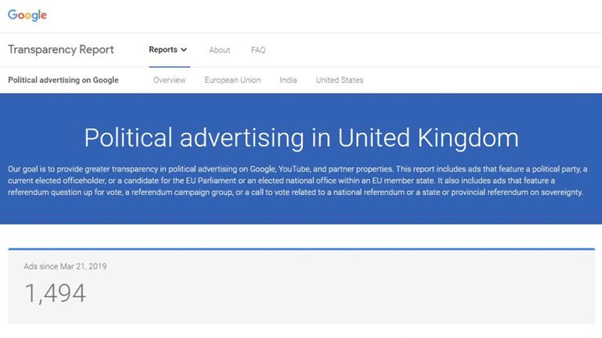
Google says that it will begin enforcing the changes in the UK “within a week,” in time for the General Election on 12 December, and in the rest of the world in January, as the company faces mounting criticism over its advertising policies during the general election.
Alongside rival Twitter – but unlike Facebook – Google said it would also ban advertisements which made “demonstrably false claims that could significantly undermine participation or trust in an electoral or democratic process”.
The tech giant said that the changes would be implemented in order to improve voter confidence in digital political advertising and international electoral processes.
It will impact search ads – which appear on Google in response to searches – display advertisements served through Google Ads, one of the most ubiquitous advertising platforms across the web, as well as on YouTube.
The company did not explain whether advertisers could upload their own lists of pre-targeted individuals and their contact details to Google for such targeted advertising, however.
In a blogpost, Google Ads executive Scott Spencer, said the company was “clarifying” its advertising policies to avoid material that could “significantly undermine participation or trust in the democratic process” being posted on its platforms. We’re proud that people around the world use Google to find relevant information about elections,” he said.
“But given recent concerns and debates about political advertising, and the importance of shared trust in the democratic process, we want to improve voters’ confidence in the political ads they may see on our ad platforms.While we’ve never offered granular microtargeting of election ads, we believe there’s more we can do to further promote increased visibility of election ads. That’s why we’re limiting election ads audience targeting to the following general categories: age, gender, and general location (postal code level).”
The new policies would apply to all advertisers and content types including “deep fakes” (doctored or manipulated media), misleading claims about the census process, and ads making “demonstrably false claims”.
“Whether you’re running for office or selling office furniture, we apply the same ads policies to everyone; there are no carve-outs,” said Spencer. “It’s against our policies for any advertiser to make a false claim-whether it’s a claim about the price of a chair or a claim that you can vote by text message, that election day is postponed, or that a candidate has died.”
He added that the company recognised that not all political claims could be adjudicated, but that the company would take appropriate action to preserve “robust political dialogue.”
However, there has recently been criticism of whether the company’s advertisements library was effectively providing transparency over who was paying for political ads during the campaigning period.
The Guardian newspaper revealed the company was under-reporting spending on political advertisements in the UK, bringing into question how effective Google’s advertisements transparency initiative has been.
Election advertisements can still be targeted based on age, gender, and post-code level location; contextual targeting, advertisements which appear on pages based on their content, will still be allowed.
Under existing British law, any candidates, political parties or non-party campaigners are required to have an imprint on any of their printed election campaigning material to show that they have produced it.
